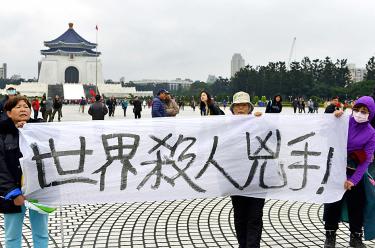President Tsai Ing-wen (蔡英文) yesterday pledged to clarify the attribution of responsibility for the 228 Incident in the most discreet manner possible, adding that she hoped future anniversaries of the tragic event could be marked by national unity.
Tsai made the remarks in her first speech on the 228 Incident as president, which was delivered at a memorial ceremony at the 228 Peace Memorial Park in Taipei on the 70th anniversary of the massacre.
“On Saturday last week, the Ministry of Culture proposed transforming the Chiang Kai-shek (蔣介石) Memorial Hall. This is the 70th anniversary of the 228 Incident and it is about time that changes are made. I believe Taiwan’s democracy is mature enough to have a discussion,” Tsai said.
Reconciliation must be built upon truth, Tsai said, adding that the National Archives Administration would launch a new effort today to collect and organize documents concerning the Incident and the White Terror era that have been scattered across different government agencies.
Tsai said the results of the effort would provide the foundation for the government to compile a national investigative report on transitional justice, which would dedicate an entire section to the Incident.
“However, I must stress that we will adopt the most discreet attitude when dealing with the attribution of responsibility for the 228 Incident,” the president said.
The 228 Incident refers to a crackdown launched by the then-Chinese Nationalist Party (KMT) regime against civilian demonstrations following an incident in Taipei on Feb. 27, 1947.
The ensuing massacre and imposition of martial law marked the beginning of the decades-long White Terror era, during which thousands of Taiwanese were arrested, imprisoned and executed.
Bereaved families have long lamented the government’s failure to officially identify the main culprit responsible for the massacre.
Shrugging off criticism that the economy should take precedence over transitional justice, Tsai said that economic growth and social justice are equally important and the goal should be pursuing both.
Tsai concluded her speech by expressing the hope that the realization of transitional justice would free all political parties from the past authoritarian baggage, ensure the recovery of truth, facilitate reconciliation between the victims and the perpetrators and remove traditional political taboos.
“I also hope that the draft transitional justice promotion bill will clear the legislative floor in the current legislative session … so that we can have an independent agency responsible for promoting transitional justice,” Tsai said.
Hsueh Hua-yuan (薛化元), chairman of the 228 Memorial Foundation, said that the victims’ families have been longing for the truth and identification of responsible parties.
“As far as the foundation is concerned, finishing the transitional justice report to prevent history from being repeated is the most crucial and fundamental purpose of transitional justice,” Hsueh said.
The commemorative ceremony, despite being briefly interrupted by protests, also saw the president hand out certificates of good character to a number of victims of the 228 Incident or their families to restore their reputations.
Source: Taipei Times - 2017/03/01





















